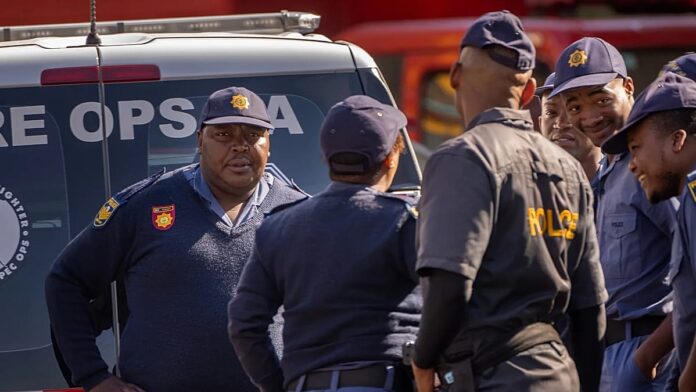South African police and army held a parade on Wednesday involving helicopters, K-9 dog units and officers on motorcycles in a show of force ahead of expected protests around this weekend’s Group of 20 (G20) world leaders summit in Johannesburg.
South Africa has deployed 3,500 extra police officers and put the army on standby under its National Joint Operational and Intelligence Structure, a body that brings police, army and intelligence services together under one command to provide security for major events.
Deputy national commissioner for policing Lieutenant General Tebello Mosikili told reporters that authorities were expecting protests in Johannesburg and other major cities.
“We will allow that right (to protest) to be exercised,” she said. “But within the proper directives and proper confines of the law.”
South African police said they have designated specific areas for protesters to gather near the summit venue, an exhibition centre next to the country’s biggest soccer stadium.
The head of Airports Company South Africa, which runs the main international airports, said it had set up “speakers’ corners” in airports where protesters would be “kindly” taken by security if they stage demonstrations when world leaders arrive.
Protests planned
Demonstrations are expected from anti-capitalists, climate activists, women’s rights campaigners, anti-migrant groups and others, some of which are raising South Africa’s own problems with poverty and inequality.
A trade union representing members of South Africa’s Afrikaner white minority has already stoked controversy by putting up billboards around Johannesburg that say: “Welcome to the most RACE-REGULATED country in the world.”
One of the boards was taken down by city authorities, prompting the Afrikaner trade union, Solidarity, to threaten legal action.
The billboards are in reference to South Africa’s affirmative action laws that advance opportunities for Black people and have become part of a diplomatic fallout between South Africa and the United States.
US President Donald Trump won’t attend the G20 summit in a boycott over his claims that South Africa’s Black-led government is pursuing racist, anti-white policies and violently persecuting its Afrikaner minority.
Trump’s claims have been widely rejected as baseless, but the US government boycott threatens to undermine the first G20 summit in Africa.
Other groups hope to use the opportunity to draw attention to a range of issues.
The Women for Change advocacy group is calling for a national shutdown on Friday, the eve of the summit.
It is asking women to boycott work on the day in protest at South Africa’s extremely high rates of violence against women and femicide.
“Because until South Africa stops burying a woman every 2.5 hours, the G20 cannot speak of growth and progress,” Women for Change said.
A South African anti-immigration group will protest against unemployment and poverty in the country, its leader said, with South Africa’s 31% unemployment rate one of the highest in the world.
A coalition of groups protesting against climate change and wealth inequality have organised an alternative summit in another part of Johannesburg starting on Thursday, saying the G20 gathering is “for the rich.”
Cleanup efforts
Authorities in Johannesburg have also embarked on a major clear-up and repair operation ahead of the summit to tackle some of the broken-down infrastructure that plagues South Africa’s biggest city.
President Cyril Ramaphosa joined the effort last week, when he put on a pair of green overalls and helped with some of the work in the township of Soweto just a few miles from where the summit will be held.
The multi-million-dollar operation for a two-day meeting of politicians has been viewed with cynicism by many in Johannesburg who have become accustomed to broken streetlights, cracked and potholed roads and deteriorating services that lead to water and electricity blackouts.
“Us hosting this G20, I don’t really think it’s going to be beneficial for South Africans, for the ordinary South Africans. It’s just a way to waste money, if I can say,” Johannesburg resident Lerato Lelusa said.
The two-day summit opens on Saturday and is expected to attract leaders and top diplomats from more than 40 countries as well as global institutions like the United Nations, the World Bank, the International Monetary Fund and the World Trade Organisation.
